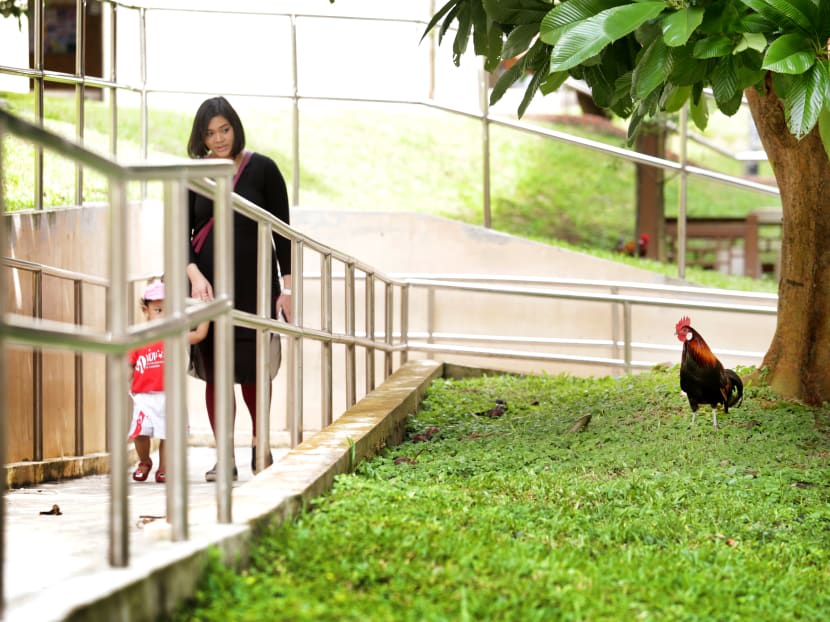Residents in a flap over chickens: Town councils received more than 4,000 complaints in last 5 years
SINGAPORE — In the last five years, government agencies and town councils have received around 4,100 complaints related to the noise and smell of live chickens in Housing and Development Board (HDB) and private residential estates.

Red Junglefowl, a wild ancestor of domestic chickens, seen at Sin Ming Avenue in 2017.
- Over the past five years, agencies and town councils received around 4,100 complaints related to live chickens in residential areas
- Of this number, 2,400 were from Housing and Development Board (HDB) estates and 1,700 were from private estates
- Currently, the limit on the number of poultry that can be reared for non-commercial reasons on any premise is 10
- However, residents in HDB flats are not allowed to rear chicken and other poultry in HDB flats for public health reasons
SINGAPORE — In the last five years, government agencies and town councils have received around 4,100 complaints related to the noise and smell of live chickens located at Housing and Development Board (HDB) and private residential estates.
Senior Minister of State for National Development Tan Kiat How, who gave these numbers on Wednesday (Nov 9), was responding to a parliamentary question by Member of Parliament (MP) Ang Wei Neng of West Coast Group Representation Constituency (GRC).
Mr Ang had asked for the number of chicken-related complaints over the past five years and whether the Ministry of National Development (MND) will be reviewing the chicken rearing policy in residential properties.
He, along with Mr Louis Ng of Nee Soon GRC and Workers' Party MP Jamus Lim of Sengkang GRC also raised supplementary questions on the topic including how many such complaints were resolved through mediation and if fines were the first course of action when complaints are made.
Mr Tan said that residents living in private properties can rear up to a maximum of 10 poultry for non-commercial purposes.
The limit is to mitigate the risks of avian disease and to safeguard human and animal health, he said.
However, residents are not allowed to keep chickens or other poultry in HDB flats for public health reasons, as well as to manage these amenities, said Mr Tan.
“When HDB gets complaints about chicken rearing in HDB flats, we work closely with agencies to engage the flat owners to make alternative arrangements to rehome the chicken where necessary.
“Private residential owners who keep chickens on their property are also urged to do their part to minimise any inconveniences to their neighbors, such as noise and smell,” said Mr Tan.
He added that disputing parties can seek mediation at the Community Mediation Center under the community dispute management framework, and more intractable cases will be referred to the Community Disputes Resolution Tribunal.
Mr Ang of West Coast GRC, who noted an increase in the number of complaints he received during a home visit to a private estate, asked if the Government is prepared to review the number of chickens allowed on private estates.
He also asked how many complaints were resolved and how many were sent to the mediation centres.
Mr Tan responded that the Government does not track the number of chickens in houses and that many of such issues were eventually resolved between neighbours.
MND, however, does not track how many were resolved through the community mediation process.
Mr Ng of Nee Soon GRC then asked what was the legislation banning the rearing of chickens in HDB flats.
In response, Mr Tan said that flat owners are not allowed to keep chickens under the memorandum of lease in the flat or any part of the common area of the building unless approved by HDB.
Associate Professor Lim of Sengkang GRC also sought clarification on the standard operating procedure when such a complaint is made and whether the first line of action is to engage in mediation or fine violators.
“I mention this because I recall as a child going through experiments where you would hatch chickens from eggs and you would keep them in the flat while they grew and we don't want to penalise young children, students who are conducting little experiments,” said Assoc Prof Lim.
Mr Tan assured Assoc Prof Lim that fines and enforcement penalties are not a first resort and MND will bring the different parties, including grassroot volunteers, neighbours and leaders, together to talk about how they can come to a consensus.
Assoc Prof Lim also asked how community chickens which “no one necessarily lays claims to” will be managed.
To this, Mr Tan said that MND will work with the local advisors and MPs to see how they can amicably resolve it.
"Removing the rooster may be one option. But there are many other ways of finding ways of accommodating for example, if it's about rooster crowing...But it's really about managing the noise by perhaps relocating the rooster, or maybe in some cases in private estates in the homes, for example, to encourage owners to cover the pen with a cloth so the rooster don't crow," he said.
"Ultimately the assurance that we give to our members of public and residents is that we want to work together with them, different segments of committee. At the end of the day, it's about our home and our neighbourhood."








